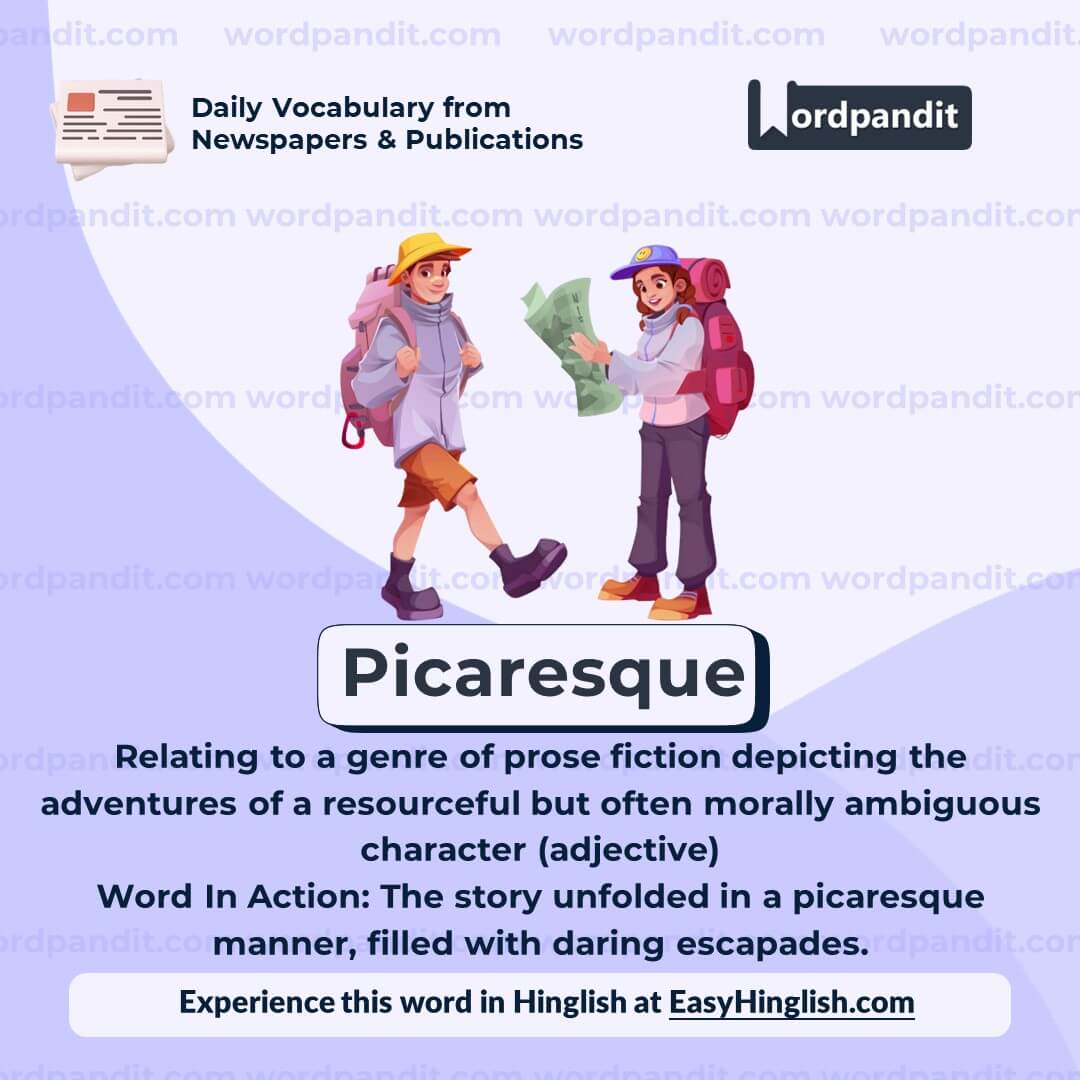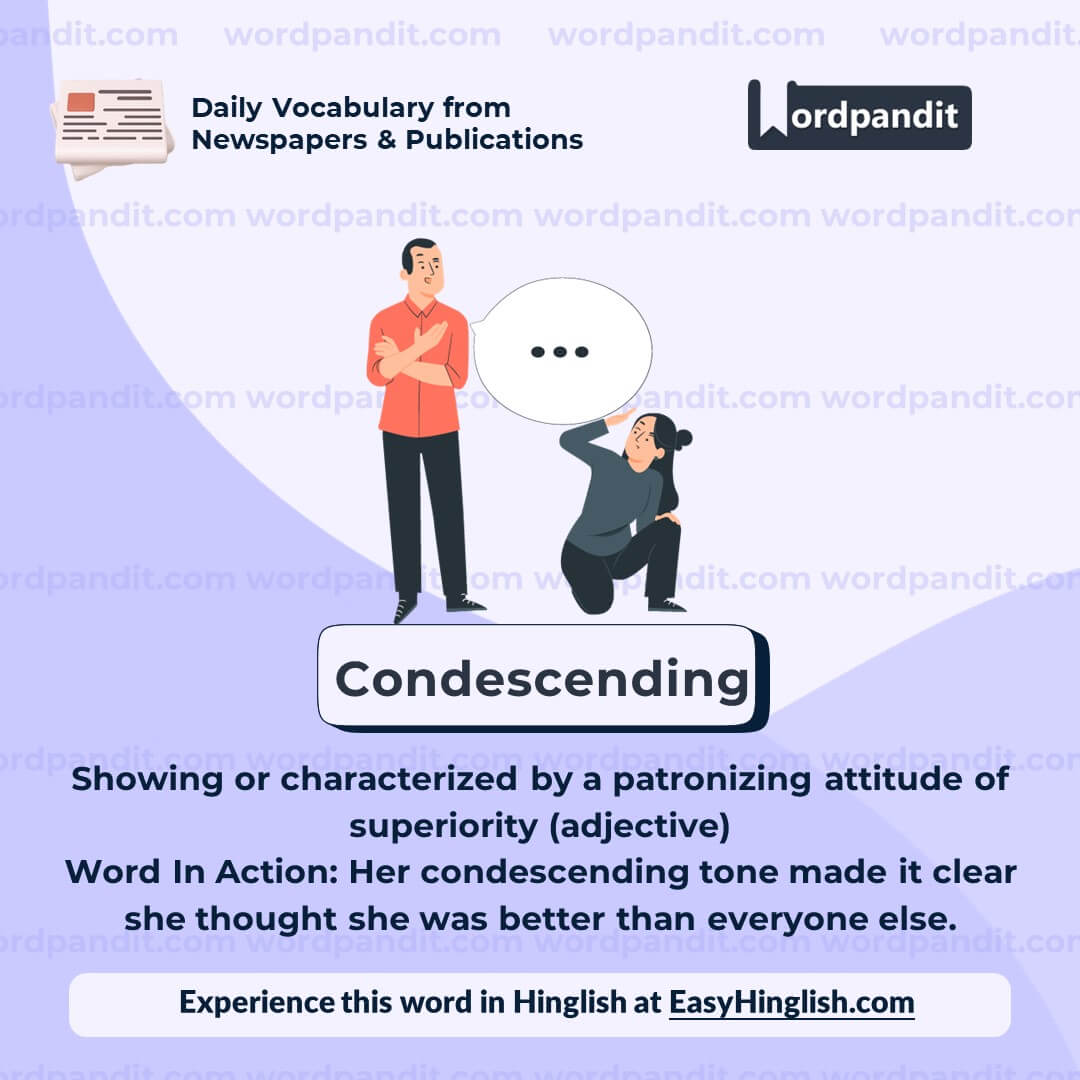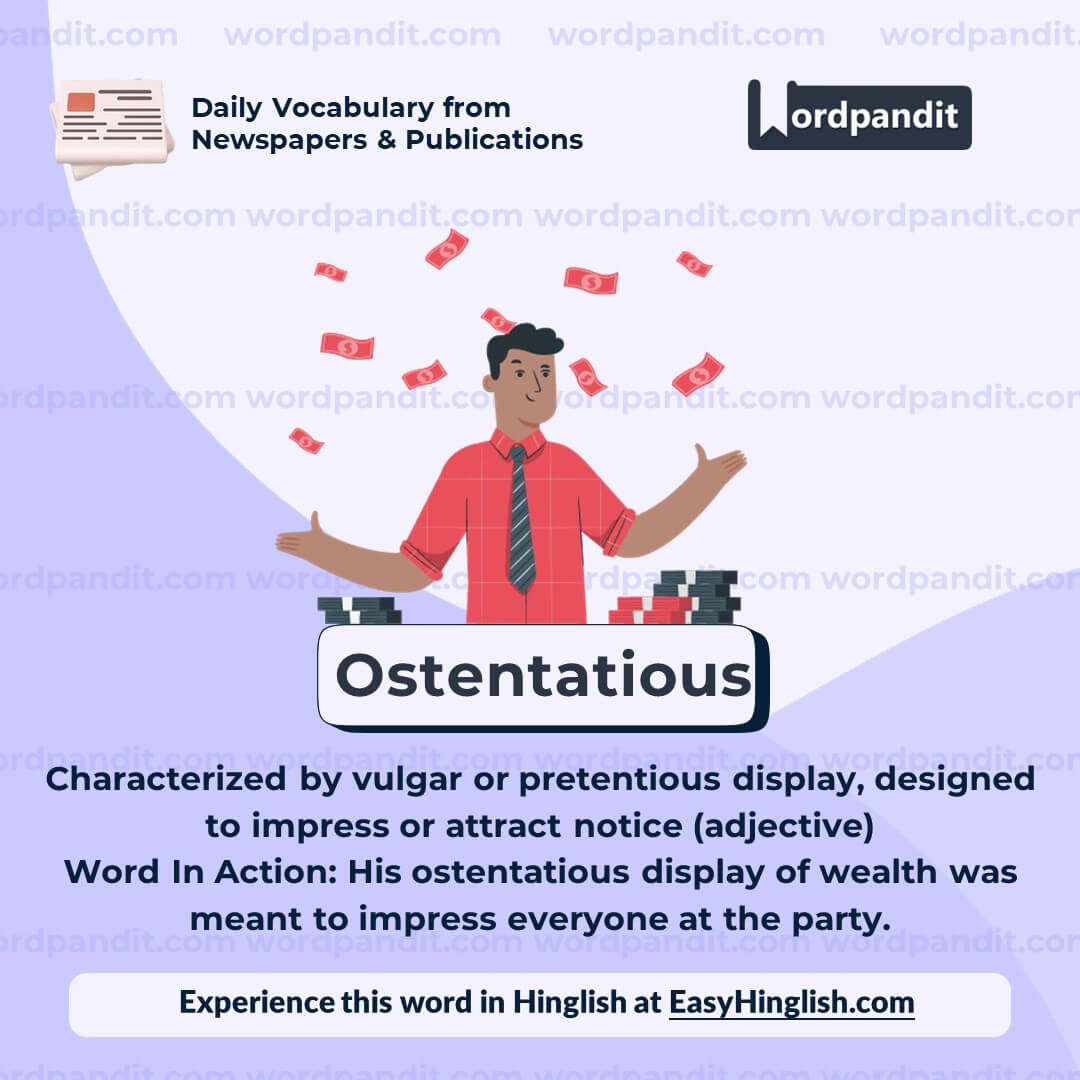Daily Vocabulary from International Newspapers and Publications
Expand Your Vocabulary with Wordpandit’s Global Vocabulary Hub
At Wordpandit, we are committed to helping you develop a truly global vocabulary by drawing from some of the most respected international publications. This section is designed to keep you ahead of the curve by introducing you to words that define global conversations and trends.
The Power of Global Sources
To help you think and communicate on a global scale, we curate vocabulary from renowned international sources, such as:
- The New York Times
- The Washington Post
- BBC
- The Guardian
- The Economist
- Scientific American
- Psychology Today
- And many more...
Stay Global, Stay Competitive
Our daily updates from international publications ensure you are consistently exposed to new words that reflect global news and developments, making sure your vocabulary is not only current but also globally relevant.
Enhance Your Global Perspective
Whether you’re preparing for international exams, aiming to excel in global business communication, or want to enhance your language skills for personal growth, Wordpandit offers the resources you need to thrive in a global context.
Effective Learning, Global Reach
Our learning methodology combines global examples, memory aids, and interactive activities, allowing you to internalize new words effectively and apply them in real-world scenarios.
Begin Your Global Vocabulary Journey Now!
Why Choose Wordpandit?
Practical Learning: Focus on words you'll actually encounter in real-world reading, enhancing your comprehension and communication skills.
Diverse Content: From current affairs to scientific breakthroughs, our varied sources expose you to vocabulary across multiple domains.
Effortless Integration: Make Wordpandit a part of your daily routine. Just a few minutes each day can significantly boost your lexicon over time.
Your Path to Vocabulary Mastery
- Visit our Daily Vocabulary section regularly
- Explore new words and their usage in context
- Practice incorporating these words into your own writing and speech
- Track your progress as your vocabulary expands
Start Your Journey Today
Embark on your vocabulary enhancement journey with Wordpandit. By consistently engaging with our daily posts, you'll build a robust vocabulary that serves you well in academic, professional, and personal contexts.
Remember, a word a day keeps linguistic limitations at bay. Make Wordpandit your daily companion in the quest for vocabulary excellence!
WORD-1: Transcendence
Context:
"Alcock saw the ‘universal absence of luxury’ as a kind of transcendence, reading into it a liberation from the materialistic rat-race of Western consumerism." - Aeon
Explanatory Paragraph:
Transcendence refers to a state or experience that goes beyond normal physical or mental limits, often carrying spiritual or philosophical significance. It signifies rising above ordinary existence to achieve a higher understanding, purpose, or reality.
Meaning: The act or state of going beyond ordinary limits; surpassing or exceeding (noun).
Pronunciation: tran-SEN-dents
Difficulty Level: ⭐⭐⭐ Advanced
Etymology: Derived from Latin transcendere, meaning "to climb over" or "go beyond," combining trans (across) and scandere (to climb).
Synonyms & Antonyms:
Synonyms: Elevation, surpassing, spiritualism, sublimity, enlightenment
Antonyms: Materialism, mundanity, ordinariness, groundedness
Usage Examples:
- The monk spoke of transcendence as a path to true inner peace.
- Art often aims to capture moments of transcendence that touch the soul.
- In meditation, she sought a sense of transcendence beyond her daily struggles.
- The climber felt a moment of transcendence as he stood atop the mountain, gazing at the vast horizon.
Cultural Reference:
"Transcendence" often appears in philosophy and religion, such as in the teachings of Immanuel Kant, who emphasized the importance of transcendent knowledge, or in Buddhism, which seeks transcendence from the cycle of suffering. - General Knowledge
Think About It:
How can transcendence be achieved in a modern, materialistic society?
Quick Activity:
Write a short paragraph describing a moment in your life when you experienced a sense of transcendence.
Memory Tip:
Remember "transcendence" by breaking it into "trans" (across) and "ascend" (rise), which together suggest rising across boundaries.
Real-World Application:
Transcendence is often applied in personal growth, spirituality, and leadership, as it involves thinking beyond immediate concerns to achieve a higher purpose or vision.
WORD-2: Consumerism
Context:
"Alcock saw the ‘universal absence of luxury’ as a kind of transcendence, reading into it a liberation from the materialistic rat-race of Western consumerism." - Aeon
Explanatory Paragraph:
Consumerism refers to the cultural and economic practice of prioritizing the acquisition of goods and services, often tied to materialism and the belief that personal happiness and social success are largely influenced by consumption. It is a defining aspect of modern economies but is often criticized for fostering wastefulness and unsustainable practices.
Meaning: The preoccupation with and emphasis on the acquisition of consumer goods (noun).
Pronunciation: kuhn-SOO-muh-riz-um
Difficulty Level: ⭐⭐ Intermediate
Etymology: From the word consume, derived from Latin consumere (to use up or spend), combined with the suffix -ism indicating a practice or ideology.
Synonyms & Antonyms:
Synonyms: Materialism, commercialism, acquisitiveness
Antonyms: Minimalism, austerity, sustainability
Usage Examples:
- Critics argue that consumerism fuels environmental degradation and resource depletion.
- The documentary highlighted the pitfalls of unchecked consumerism in modern society.
- Many people are now adopting minimalist lifestyles to counter the effects of consumerism.
- Consumerism often equates self-worth with the ability to purchase and display luxury items.
Cultural Reference:
Consumerism is a recurring theme in literature and film, such as in the satirical portrayal of corporate greed in the movie "The Wolf of Wall Street" or the critique of materialistic culture in George Orwell’s "1984." - General Knowledge
Think About It:
How can individuals balance the need for material goods with ethical and sustainable practices?
Quick Activity:
Make a list of five items you purchased recently. Reflect on whether they were needs or wants, and consider how consumerism influenced your decisions.
Memory Tip:
Link "consumerism" to "consume," and think of it as the "ism" or ideology of consumption.
Real-World Application:
Understanding consumerism helps businesses shape marketing strategies while encouraging individuals to make informed, ethical choices about consumption.
WORD-3: Picaresque
Context:
"The Life of Little Lázaro of Tormes, invented the picaresque form of storytelling through the adventures of an antihero, little Lázaro." - Aeon
Explanatory Paragraph:
Picaresque refers to a style of storytelling that revolves around the episodic adventures of a roguish protagonist, often an antihero of low social status who uses wit and cunning to survive in a corrupt society. These tales usually feature satire and social commentary.
Meaning: Relating to a genre of prose fiction depicting the adventures of a resourceful but often morally ambiguous character (adjective).
Pronunciation: pik-uh-RESK
Difficulty Level: ⭐⭐⭐ Advanced
Etymology: From the Spanish word picaresco, derived from pícaro, meaning "rogue" or "rascal," first used in reference to 16th-century Spanish literature.
Synonyms & Antonyms:
Synonyms: Roguish, episodic, satirical, adventurous
Antonyms: Heroic, upright, structured, moralistic
Usage Examples:
- The novel adopts a picaresque style, chronicling the misadventures of a clever but flawed protagonist.
- Picaresque narratives often critique societal norms through the eyes of their cunning antiheroes.
- He enjoyed reading picaresque tales, where resourceful characters navigated a world of chaos and deceit.
- The movie’s picaresque structure mirrored the unpredictable life of its mischievous lead character.
Cultural Reference:
The picaresque genre is exemplified by works such as "Don Quixote" by Miguel de Cervantes and "The Adventures of Huckleberry Finn" by Mark Twain, which share themes of social critique and the adventures of unconventional protagonists. - General Knowledge
Think About It:
Why do picaresque tales resonate with readers across centuries, despite their focus on morally ambiguous characters?
Quick Activity:
Create a brief outline for a picaresque story featuring a resourceful antihero navigating a modern, corrupt society.
Memory Tip:
Think of "picaresque" as "picaro-esque," relating to the escapades of a pícaro, or rogue, in a satirical and episodic format.
Real-World Application:
The picaresque format inspires modern storytelling in books, movies, and TV shows by emphasizing flawed, relatable characters who navigate challenging social landscapes.
WORD-4: Condescending
Context:
"By turns reverential and condescending, ideas of Japan’s enlightened design sensibilities swept Western society. In 1882, the Vanderbilts installed an ostentatious Japanese parlour." - Aeon
Explanatory Paragraph:
Condescending refers to behaving toward someone in a way that shows a sense of superiority, often disguised as kindness or politeness. It implies looking down on others, suggesting they are less capable or knowledgeable.
Meaning: Showing or characterized by a patronizing attitude of superiority (adjective).
Pronunciation: kon-duh-SEND-ing
Difficulty Level: ⭐⭐ Intermediate
Etymology: Derived from the Latin word condescendere, meaning "to stoop together," from con (together) and descendere (to descend or come down).
Synonyms & Antonyms:
Synonyms: Patronizing, arrogant, snobbish, superior
Antonyms: Respectful, humble, modest, considerate
Usage Examples:
- The teacher’s condescending tone made the students feel belittled.
- He offered his advice in a condescending manner, as if she couldn’t solve the problem herself.
- Her condescending remarks about his choice of clothing were both rude and unnecessary.
- The article criticized the condescending attitude of colonial powers toward indigenous cultures.
Cultural Reference:
The concept of condescension is often explored in literature, such as in Jane Austen's "Pride and Prejudice," where characters like Lady Catherine de Bourgh exhibit a patronizing attitude toward others. - General Knowledge
Think About It:
What are some subtle ways that condescension can manifest in conversations, and how can it be avoided?
Quick Activity:
Think of a recent interaction where someone’s tone felt condescending. Write a brief response that addresses the situation politely but assertively.
Memory Tip:
Link "condescending" to "descend," imagining someone metaphorically "stooping down" to talk to others from a perceived higher position.
Real-World Application:
Recognizing and avoiding condescension is crucial in leadership, education, and customer service, where respectful communication fosters trust and collaboration.
WORD-5: Ostentatious
Context:
"By turns reverential and condescending, ideas of Japan’s enlightened design sensibilities swept Western society. In 1882, the Vanderbilts installed an ostentatious Japanese parlour." - Aeon
Explanatory Paragraph:
Ostentatious describes something that is showy or designed to impress others, often in an exaggerated or overly elaborate way. It carries a sense of excessive display meant to attract attention or admiration.
Meaning: Characterized by vulgar or pretentious display, designed to impress or attract notice (adjective).
Pronunciation: os-ten-TAY-shus
Difficulty Level: ⭐⭐ Intermediate
Etymology: From the Latin word ostentare, meaning "to display" or "show," derived from ostendere, meaning "to stretch out to view."
Synonyms & Antonyms:
Synonyms: Showy, pretentious, flamboyant, grandiose
Antonyms: Modest, understated, unpretentious, simple
Usage Examples:
- The billionaire's ostentatious mansion featured gold-plated walls and a diamond-studded chandelier.
- Her ostentatious dress at the party drew admiration as well as quiet criticism for being over-the-top.
- The ostentatious display of wealth at the wedding overshadowed the couple's personal story.
- In an effort to impress his clients, he drove them around in his ostentatious sports car.
Cultural Reference:
The concept of ostentation is frequently explored in literature, such as in F. Scott Fitzgerald’s "The Great Gatsby," where Gatsby’s lavish parties symbolize his ostentatious attempts to gain social approval and love. - General Knowledge
Think About It:
Is ostentation always negative, or can it sometimes serve as an effective way to make a statement or leave an impression?
Quick Activity:
Think of a public figure or fictional character known for being ostentatious. Write a brief description of how their behavior or style reflects this word.
Memory Tip:
Remember "ostentatious" by linking it to "show off" and "tent"—imagine someone setting up a large, overly decorative tent to draw attention.
Real-World Application:
In marketing and branding, ostentatious designs and campaigns can attract attention, but companies must balance this with authenticity to avoid alienating audiences.


















